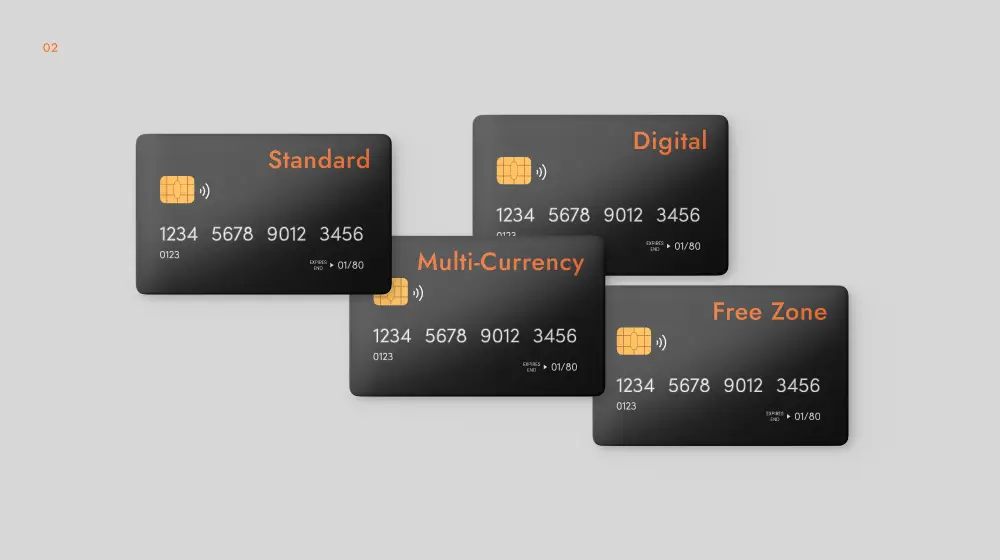Opening a business bank account in the UAE as a non-resident is one of the most important steps for entrepreneurs, startups, small businesses, and international investors who want to establish a presence in the region. The UAE offers a unique combination of strategic location, tax-friendly policies, and access to global markets, making it an attractive destination for business operations. However, navigating the process of opening a corporate bank account as a non-resident can be complex, with requirements that differ from those for residents and significant variations depending on the bank and type of business.
Table of Contents
In this guide, we will walk you through everything you need to know to open a UAE business bank account non resident in 2025. You will learn about the latest banking trends that impact non-resident account holders, who is eligible to open a corporate account, the types of accounts available, documentation requirements, remote account options, fees and costs, compliance regulations, and tips for selecting the right bank.
UAE Banking Trends for Non-Residents in 2025

Opening an open UAE business bank account non resident is becoming more accessible in 2025, but banks have also tightened verification standards. Here are the core trends shaping the process:
Stricter KYC but Faster Approvals
Banks now verify cross-border transactions more aggressively, especially for anyone applying for a non resident business bank account UAE.
At the same time, once documents are approved, onboarding timelines are quicker than previous years.
Remote Opening Is Becoming Normal
More banks allow a corporate bank account UAE remote setup through digital verification, video KYC, and online document uploads.
Non-residents can complete 80–100% of the process without traveling, especially when setting up an open company bank account in Dubai non resident.
Higher Documentation Requirements
The requirements non resident business bank account UAE category is stricter than for local residents.
Expect banks to request business activity proof, client pipelines, and source-of-funds documentation before approval.
More Digital-First Banking Options
With the UAE pushing fintech expansion, digital banks and hybrid banks are offering easier onboarding for non-residents, often with lower minimum balance requirements. According to Emirates NBD, 89% of UAE consumers now use digital-first bank accounts.
Greater Emphasis on Compliance & Transparency
Banks are prioritizing businesses that demonstrate clean financial history, simple ownership structures, and transparent cross-border transactions.
Who Can Open a UAE Business Bank Account as a Non-Resident
Not everyone qualifies for a non-resident corporate account in the UAE. Banks follow strict compliance rules, but they do allow several categories of entrepreneurs and investors to open an account, remotely or through a representative.
Entrepreneurs With an Existing UAE Company
If you already own a mainland, free zone, or offshore entity, you can apply for a corporate account even if you don’t live in the UAE.
Banks mainly care about your business activity, ownership structure, and source of funds.
Foreign Investors Setting Up a New UAE Company
You don’t need residency to start the process.
As long as your company is registered, you’re eligible to apply for a non-resident business bank account.
This is common for investors building holding companies, consulting firms, e-commerce operations, or global trading structures.
SME Owners Operating Internationally
Many SMEs use a UAE entity to streamline global operations.
Banks will typically accept applications if you can show clear revenue streams, clients, contracts, or invoices that justify UAE banking.
Digital Entrepreneurs & Online Business Owners
If your business is remote-first: coaching, e-commerce, marketing, SaaS, consulting, you can still qualify without living in the UAE.
Banks may ask for proof of activity, such as website analytics, invoices, client lists, or payment gateway statements.
Multi-Country Business Owners
If you operate across multiple jurisdictions and want a UAE account for stability or tax efficiency, you’re eligible.
These structures often require extra documentation to show transparent ownership and clean financial trails.
Holding Companies & SPVs
Non-residents commonly open UAE bank accounts for holding companies (assets, shares, IP) or SPVs created for investment or fundraising.
Who Banks Usually Reject
Banks tend to avoid:
- Shell companies with no activity
- Businesses with unclear ownership trails
- High-risk industries without proper compliance
- Applicants with no business plan or financial history
Types of Corporate Bank Accounts Available for Non-Residents

When you open UAE business bank account non resident, you’ll usually choose between a few core account types. Each option depends on your business model, activity level, and how you plan to manage funds remotely.
1. Standard Corporate Bank Account
This is the classic option for most businesses.
Ideal if you’re opening a non resident business bank account UAE for regular operations such as receiving payments, sending invoices, and managing international suppliers.
You get:
- IBAN
- Multi-currency support
- Online banking
- Corporate debit card
- International transfers
2. Multi-Currency Corporate Account
Perfect if you’re running a global or online business.
Banks allow you to hold AED, USD, EUR, GBP, and more… helpful when you open company bank account in Dubai non resident and need to manage revenue across different markets.
Best for:
- E-commerce
- Service businesses with global clients
- Import/export operations
3. Digital or Remote-First Corporate Account
These accounts are built for remote onboarding and low-maintenance banking.
Many entrepreneurs prefer this when setting up a corporate bank account UAE remote without flying to Dubai.
Benefits:
- Faster onboarding
- Lower minimum balance
- App-based verification
- Remote KYC
4. High-Value (Private) Corporate Accounts
Designed for larger companies or investors with bigger transaction volumes.
Banks offer premium service, relationship managers, and enhanced transaction limits.
Suited for:
- Holding companies
- Asset management
- High-volume trading businesses
5. Free Zone Corporate Accounts
If your UAE company is in a free zone, banks offer dedicated account setups tailored for foreign-owned entities.
This is a common path for those meeting the requirements non resident business bank account UAE without residency.
Good for:
- Consulting firms
- Media companies
- Tech startups
- Online businesses
Documentation & Requirements for Non-Resident Accounts

To open UAE business bank account non resident, banks need clear proof of identity, business activity and financial background. Requirements vary slightly by bank, but most expect the documents below.
1. Passport Copy
A valid passport copy for all shareholders and signatories. A UAE visa is optional, which makes it easier for anyone opening a non resident business bank account UAE.
2. Proof of Address
Banks accept utility bills or bank statements from your home country, usually issued within the last 90 days. This applies whether you’re opening a standard account or a corporate bank account UAE remote.
3. Company Formation Documents
Trade license, incorporation papers, shareholder details and MOA or AOA. These confirm the legal structure when you open company bank account in Dubai non resident.
4. Business Profile
A short explanation of what the company does, where clients are based and expected monthly transactions. Banks use this to assess risk.
5. Proof of Experience
A simple CV or LinkedIn profile showing your background in the business activity.
6. Sample Contracts or Invoices
If available, banks may ask for early proof of business to understand how the company will operate.
7. Bank Statements
Three to six months of statements from your home-country bank, used to verify financial behaviour.
8. UBO Information
Details of anyone owning 25 percent or more of the company, which is standard for requirements non resident business bank account UAE.
Step-by-Step Guide to Opening an Account Remotely

Opening a UAE corporate account from abroad is straightforward if you follow the process in the right order. Whether you want to open UAE business bank account non resident for a new venture or scale an existing company, banks focus on proper documentation and transparent activity. Below is the typical remote onboarding flow most non-residents follow today.
1. Choose Your Company Structure
Decide whether your business will operate through a mainland license or a free zone. This affects the bank options available when you set up a non resident business bank account UAE.
2. Gather All Required Documents
Prepare passport copies, proof of address, company formation papers and recent bank statements. These are the core documents needed, and having them ready avoids delays.
3. Submit an Online Application
Most banks now allow remote applications through a digital form. You’ll upload documents and provide a simple overview of your business model and expected transactions.
4. Complete KYC Verification
Banks usually arrange a video call for identity verification, business questions and compliance screening. This step is mandatory for anyone trying to open company bank account in Dubai non resident or from any other emirate.
5. Receive Initial Approval
Once the bank’s compliance team reviews your documents, they issue an approval confirming that your company meets their requirements.
6. Fund the Account
Some banks require an initial deposit or minimum balance before activating the account. Others allow activation with zero funding depending on the account type.
7. Get Access to Online Banking
After activation, you receive IBAN details, login credentials and access to online banking tools. You can now send and receive payments and manage everything remotely.
Costs, Minimum Balances, and Fees
When you open UAE business bank account non resident, it is important to understand the associated costs, as fees vary depending on the type of account and the bank you choose. Whether you plan to open company bank account in Dubai non resident through a free zone or a mainland entity, having a clear picture of charges will help you plan your finances.
Minimum Balance
Most banks require a monthly minimum balance of AED 25,000–50,000 for standard corporate accounts. Premium or high-value accounts may require AED 100,000 or more. Some digital or remote accounts offer lower thresholds for a non resident business bank account UAE.
Account Opening Fees
Banks typically charge a one-time setup fee to cover document verification and compliance checks. Fees generally range between AED 1,000 and AED 5,000 depending on the account type and banking package.
Monthly Maintenance Fees
If the required minimum balance is not maintained, banks may impose monthly fees between AED 150 and AED 300. These fees vary based on account type and services included.
International Transfers
For businesses operating internationally, banks charge for cross-border transactions. Outgoing transfers usually cost AED 40–80, while incoming SWIFT messages may be AED 1–2. Currency conversion margins may also apply for multi-currency accounts.
Optional Services
Some banks provide value-added services like multi-currency wallets, merchant accounts, or dedicated account managers. These services can carry additional fees depending on usage, but they are often helpful for non-residents managing global operations.
Compliance, KYC, and Regulatory Considerations
Compliance is a critical aspect when you open UAE business bank account non resident. UAE banks follow strict anti-money laundering (AML) and know-your-customer (KYC) regulations to ensure all corporate accounts operate transparently and legally. Non-residents must be prepared to meet these standards to avoid delays or rejection.
Know Your Customer (KYC)
Banks require detailed identification for all shareholders, directors, and signatories. This includes passport copies, proof of address, and sometimes proof of business experience. KYC ensures that the non resident business bank account UAE is being opened by legitimate owners with verified activity.
Ultimate Beneficial Ownership (UBO)
Applicants must disclose all individuals who own 25% or more of the company. This is standard for requirements non resident business bank account UAE and is a key part of compliance for corporate accounts.
Source of Funds and Business Activity
Banks often ask for contracts, invoices, or proof of investment to verify that funds are legitimate. Demonstrating real business activity is crucial when you open company bank account in Dubai non resident, particularly for cross-border operations.
Ongoing Monitoring
Even after account opening, banks perform periodic reviews to ensure continued compliance. Non-residents with corporate bank account UAE remote access must provide updated documents or respond to bank inquiries when requested.
Industry-Specific Requirements
Certain sectors: financial services, real estate, trading, and crypto-related businesses… face additional scrutiny. Banks may request extra documentation to satisfy regulatory standards for non-resident accounts.
Choosing the Right Bank for Non-Residents
Selecting the right bank is crucial when you open UAE business bank account non resident. The choice affects account features, costs, onboarding speed, and remote management options. Not all banks are equally flexible for non-residents, so careful selection is essential.
1. Traditional Banks
Major banks such as Emirates NBD, ADCB, Mashreq, and Abu Dhabi Commercial Bank are widely used. They offer reliable services, multi-currency accounts, and strong compliance support. Traditional banks are a good choice if you prefer a stable, established option for a non resident business bank account UAE.
2. Digital-First and Neo Banks
Fintech solutions and digital-first banks provide faster onboarding and lower minimum balances. These banks are ideal if you want a corporate bank account UAE remote without visiting the UAE physically. Many also offer integrated online tools for global operations.
3. Free Zone Bank Partnerships
Free zones like DMCC, DIFC, and RAK create partnerships with banks that simplify account opening for foreign owners. If you plan to open company bank account in Dubai non resident through a free zone, these partnerships can reduce friction and processing time. There are over 200,000 companies registered in UAE free zones, according to the UAE Free Zone Authority.
4. Factors to Consider
When choosing a bank, assess:
- Minimum balance and fees
- Online banking capabilities
- International transfer support
- KYC and compliance flexibility
- Customer support availability
Selecting a bank aligned with your business needs ensures smooth operations and compliance when managing a non resident business bank account UAE.
Common Challenges and How to Overcome Them
Opening a corporate account as a non-resident can have hurdles, but knowing them helps when you open UAE business bank account non resident.
1. Documentation
Banks require detailed identity and company documents.
Solution: Prepare all paperwork to meet the requirements non resident business bank account UAE.
2. Minimum Balances
High minimums can be tough for startups.
Solution: Use digital or free zone accounts with lower thresholds for a non resident business bank account UAE.
3. Verification Delays
Remote applications may take time due to KYC checks.
Solution: Respond promptly and provide proof of business to open company bank account in Dubai non resident efficiently.
4. Limited Bank Options
Some banks do not accept non-residents.
Solution: Choose banks experienced with international clients or free zone partnerships.
5. Transfer Limitations
International transfers may be restricted or costly.
Solution: Pick banks with multi-currency accounts and clear transfer policies for a corporate bank account UAE remote.
Conclusion

Opening a corporate bank account in the UAE as a non-resident is essential for international entrepreneurs seeking access to the region’s financial system. By understanding eligibility, account types, documentation, fees, and compliance, you can successfully open UAE business bank account non resident and manage operations remotely.
Digital banking, multi-currency support, and free zone partnerships make the process easier, while careful bank selection helps avoid delays. For businesses looking for guidance, GCG Structuring assists in meeting all requirements non resident business bank account UAE, choosing the right bank, and handling documentation. With expert support, you can confidently open company bank account in Dubai non resident and maintain smooth financial operations.
FAQ
1. 0 Can I open a UAE business bank account as a non-resident?
Yes, you can open UAE business bank account non resident if you have a registered UAE company.
2. 0 What documents are needed?
Banks require passports, proof of address, company formation papers, and UBO details for a non resident business bank account UAE.
3. 0 Can I open an account remotely?
Yes, most banks allow a corporate bank account UAE remote through online KYC and document submission.
4. 0 Are there minimum balances or fees?
Yes, balances usually range from AED 25,000–100,000, with monthly maintenance and transfer fees.
5. 0 Which account types can I choose?
Options include standard, multi-currency, digital/remote, and free zone accounts to open company bank account in Dubai non resident.





